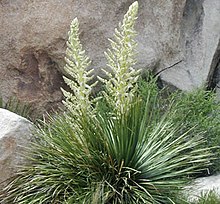Nolina parryi (Parry's beargrass,[2] Parry nolina,[3] or giant nolina)[3] is a flowering plant that is native to Baja California, southern California and Arizona.
| Nolina parryi | |
|---|---|

| |
| Scientific classification | |
| Kingdom: | Plantae |
| Clade: | Tracheophytes |
| Clade: | Angiosperms |
| Clade: | Monocots |
| Order: | Asparagales |
| Family: | Asparagaceae |
| Subfamily: | Nolinoideae |
| Genus: | Nolina |
| Species: | N. parryi
|
| Binomial name | |
| Nolina parryi | |
| Synonyms[1] | |
| |
Description
editIt can exceed 2 m (6+1⁄2 ft) in height, its inflorescence reaching 4 m (13 ft). The trunk is up to 60 cm (24 in) in diameter. The leaves are borne in dense rosettes, each with up to 220 stiff linear leaves up to 140 cm (55 in) long and 2–4 cm (1–1+1⁄2 in) broad.[4] It is dioecious, with separate male and female plants; the flowers are white, about 6 mm (1⁄4 in) wide, produced on the 60 cm (24 in) tall plume-like inflorescence from April to June.[3][4][5]
Distribution and habitat
editNative to Baja California, southern California[4] and Arizona, the species can be found in deserts and mountains at altitudes of up to 2,100 m (6,900 ft).
Uses
editNative Americans consumed the young stems and wove the leaves into baskets.[4]
References
edit- ^ Kew World Checklist of Selected Plant Families
- ^ USDA, NRCS (n.d.). "Nolina parryi". The PLANTS Database (plants.usda.gov). Greensboro, North Carolina: National Plant Data Team. Retrieved 20 July 2015.
- ^ a b c Flora of North America: Nolina parryi
- ^ a b c d Spellenberg, Richard (2001) [1979]. National Audubon Society Field Guide to North American Wildflowers: Western Region (rev ed.). Knopf. p. 327. ISBN 978-0-375-40233-3.
- ^ Jepson Flora Project: Nolina parryi
Further reading
edit- Stewart, Jon Mark (1998), Mojave Desert Wildflowers, p. 7.
External links
edit- Media related to Nolina parryi at Wikimedia Commons
- Calflora Database: Nolina parryi (Parry's beargrass, Parry's nolina)
- USDA Plants Profile for Nolina parryi (Parry's beargrass)
- UC CalPhotos gallery